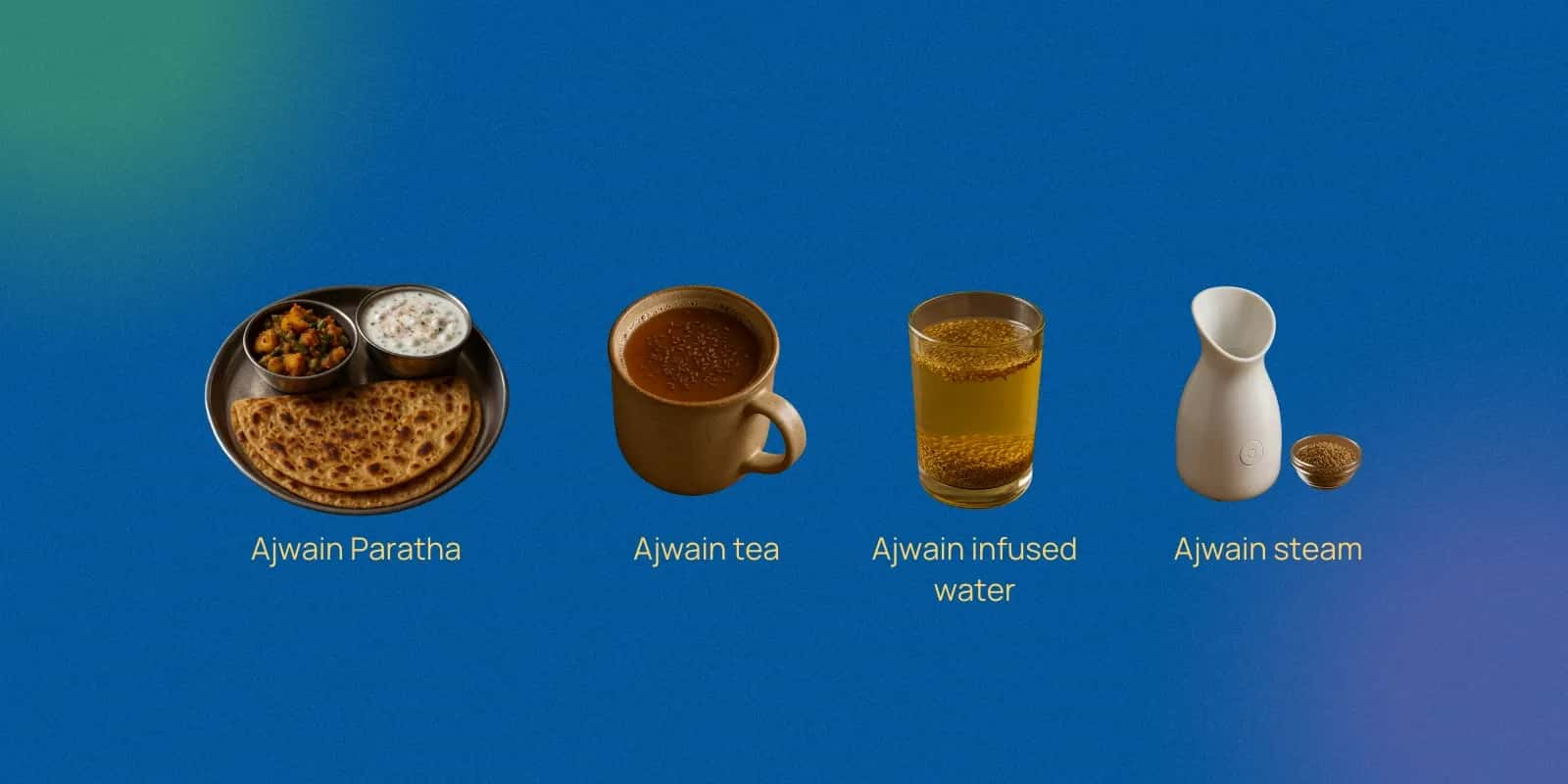6 Emerging Benefits and Uses of Ajwain (Carom Seeds) You Should Know

Introduction
Have you ever wondered why most Indian kitchens always have a small jar of ajwain seeds? Known to be a staple spice in parathas and also used as an Ayurvedic home remedy to treat digestive problems, ajwain (carom seeds) and its leaves have had a strong presence in households.
The one that was initially regarded as a cooking secret by grandmothers is increasingly being acknowledged worldwide for its health-giving properties.
In recent years, scientific research and health enthusiasts have begun to report on the numerous advantages of ajwain seeds, ajwain water benefits, and even the increasing trend of ajwain leaf applications in herbal medicine and in cooking.
This blog explores the plant, its history, and six emerging health benefits, along with practical ways to use ajwain effectively in everyday life.
What are Ajwain Seeds and Leaves? Understanding the Plant and Its Uses
Ajwain (Trachyspermum ammi), also known as carom seeds, is a member of the Apiaceae family, along with relatives such as cumin and fennel. The plant cultivates well in dry areas of the Indian subcontinent, especially in Rajasthan, Gujarat, and Madhya Pradesh. Although the seeds are common among most people, the ajwain leaf is also popular in folk medicine and contemporary cuisine.
Ajwain tastes pungent with a sharp flavour and an aroma similar to thyme because of its high thymol level. The therapeutic benefits of both ajwain seeds and leaves have been recognized in Ayurveda and Unani medicine for many centuries to treat digestive issues and respiratory conditions, as well as serve as an antiseptic.
How Ajwain Seeds and Leaves Are Harvested and Used in Cooking
The seeds of the plant are picked when they change colour, become brown and dry, and are then used as a form of culinary and medicinal food. Raw leaves are commonly consumed with fritters, tea, salads, and chutneys. Families also use herbal infusions containing ajwain water to treat everyday stomach ailments.
Nowadays, ajwain is being utilised not only in Indian homes but also in the Middle East, North Africa, and even Europe.

Top 6 Health Benefits of Ajwain Seeds and Ajwain Water
The emerging research and traditional knowledge are in agreement that ajwain can be an easy and effective supplement in daily diets. The six most renowned benefits are mentioned below.
1. Ajwain Benefits for Female Health and Digestion
The most appreciated ajwain benefits for females include alleviating menstrual cramps, normalising digestion amidst hormonal fluctuations, and reducing bloating. Consuming water with ajwain after meals is an old remedy to boost metabolism and counter indigestion.
Women who feel unwell after giving birth to their baby often drink warm ajwain water because it cleanses the stomach, pacifies digestion, and restores strength.
2. Weight Management and Appetite Control with Ajwain Water
Drinking Ajwain seed water benefits weight control and is one of the new health trends. Ajwain increases digestive enzymes, suppresses hunger, and improves metabolism, facilitating weight control.
Nutritionists recommend drinking a glass of warm ajwain water in the morning to aid in fat breakdown and support the rest of the day's calorie intake.
3. Respiratory Health and Anti-inflammatory Properties
Ajwain is used as a natural remedy for coughs and mild childhood illnesses, such as colds and asthma. The seeds contain anti-inflammatory and antimicrobial components that help drain mucus, ease sore throats, and open up breathing passages. Ajwain leaves are beneficial in respiratory treatments, such as tea and decoctions, according to herbalists.
4. Ajwain Seeds for Skin Health and Detoxification
The detoxifying effects of ajwain seeds enhance skin health by eliminating body toxins. The antibacterial property can also be used to reduce acne, simple skin irritations, and shallow scars by applying an ajwain paste. Drinking ajwain water further improves skin clarity due to its benefits for better digestion.
5. Supports Heart Health and Blood Pressure Regulation
Ajwain contains a high amount of fibre and essential oils, which may help treat cholesterol and blood pressure problems. Frequent consumption of food or ajwain water has been linked to improved blood flow, reduced arterial stiffness, and enhanced cardiovascular performance.
6. Natural Remedy for Indigestion and Gas Relief
The most common use of ajwain leaves is for treating indigestion, bloating, and gas. A pinch of roasted jeera and ajwain is still a first-choice home cure for stomach upsets in India. The combination is a traditional one due to the innate carminative properties of ajwain, which enable it to relieve gas and facilitate the digestive process.

Combining Ajwain with Jeera and Saunf: Powders and Their Benefits
Cumin (jeera) and fennel (saunf), combined with ajwain, are among the best traditional remedies. The benefits of Jeera ajwain saunf powder are better digestion, curbed acidity, and fresher breath. It can also lead to the regulation of blood sugar levels and increased nutrient absorption.
As saunf is also a type of fennel, many homes roast jeera and ajwain together with saunf, make a fine powder out of it, and keep it aside to use every day of the year. A spoonful of warm water after meals can help prevent bloating and indigestion.
How to Prepare and Use Ajwain Water and Ajwain Powder at Home
Making ajwain water at home is simple:
- Boil one teaspoon of ajwain seeds in a glass of water for 5-10 minutes.
- Strain and drink warm, preferably in the morning or after meals.
Ajwain seeds are roasted lightly, then finely ground into a powder which can be stored in an airtight container. You can blend it with salt and lemon to get swift relief from stomach pain, or blend it with teas and buttermilk.
Ajwain leaf benefits can also be enjoyed with a preparation of ajwain leaf-based fritters, chutneys, and herbal tea.
Side Effects and Precautions When Using Ajwain Seeds or Leaves
Although the benefits of ajwain seeds are many, overconsumption may cause acidity, nausea, or even headache. Pregnant women are advised to check with their doctor before including ajwain water or ajwain seeds in their diet because the high level of thymol can occasionally produce uterine contractions.
If you plan to use ajwain leaf or paste topically, perform a patch test to ensure there is no irritation.

FAQs
Q. What are the benefits of ajwain seeds for health?
A. The benefits of ajwain seeds include relief from indigestion, bloating, and acidity. They also have antimicrobial and anti-inflammatory properties, support respiratory health, regulate blood pressure, and may improve metabolism, making them a natural household remedy in Indian kitchens.
Q. How do you make and drink ajwain seed water?
A. To prepare ajwain water, boil one teaspoon of ajwain seeds in a glass of water for 5–10 minutes, strain, and drink warm. Consuming it daily on an empty stomach improves digestion, metabolism, and overall gut health naturally.
Q. Can ajwain water help with digestion and weight loss?
A. Yes, ajwain water benefits digestion by reducing acidity and bloating while enhancing nutrient absorption. It also supports weight management by curbing appetite, boosting metabolism, and promoting fat breakdown, making it a simple, effective natural remedy for weight loss support.
Q. What benefits do ajwain leaves have compared to seeds?
A. Ajwain leaves benefit include relief from cough, colds, and asthma due to their expectorant properties. While seeds aid digestion, ajwain leaf uses extend to making herbal teas, chutneys, and remedies for respiratory issues, offering versatility beyond culinary seasoning.
Q. Are there any side effects of drinking ajwain water regularly?
A. Excess ajwain water intake may cause acidity, nausea, or stomach irritation. Overuse can sometimes lower blood pressure or interfere with certain medications. Moderation is essential; typically, one small glass daily is safe for most healthy adults.
Q. How is ajwain used in blends with jeera and saunf?
A. Jeera, ajwain, and saunf powder benefits include digestion, acidity relief, and bloating control. This blend improves metabolism, reduces cramps, and freshens breath. Consumed with warm water, jeera and ajwain combinations also aid detoxification, making it a popular household digestive remedy in India.
Q. Can ajwain seeds be used safely during pregnancy?
A. Small amounts of ajwain seeds may ease indigestion and gas during pregnancy, but excessive intake can trigger uterine contractions. Pregnant women should consult a doctor before regular use to ensure safety, especially in later stages.
Q. What is the best way to use ajwain seeds for female health?
A. Ajwain benefits for female health include relief from menstrual cramps, irregular cycles, and digestive discomfort. Drinking warm ajwain water or chewing roasted seeds with salt helps reduce bloating and cramping, making it a natural women’s health remedy.
Q. How do I prepare ajwain powder or ajwain water at home?
A. For ajwain powder, dry roast the seeds lightly and grind them into a fine powder. For ajwain water, boil seeds in water, strain, and drink warm. Both can be consumed daily in moderation for improved digestion, metabolism, and overall wellness.

10 Effective Ways to Reduce Stress

10 Monsoon Diseases You Should Be Aware of in India

10 Health Benefits of Reflexology You Should Know

10 Ways of Reorienting With Respectful Parenting

10 Weirdest Myths About Weight Training


